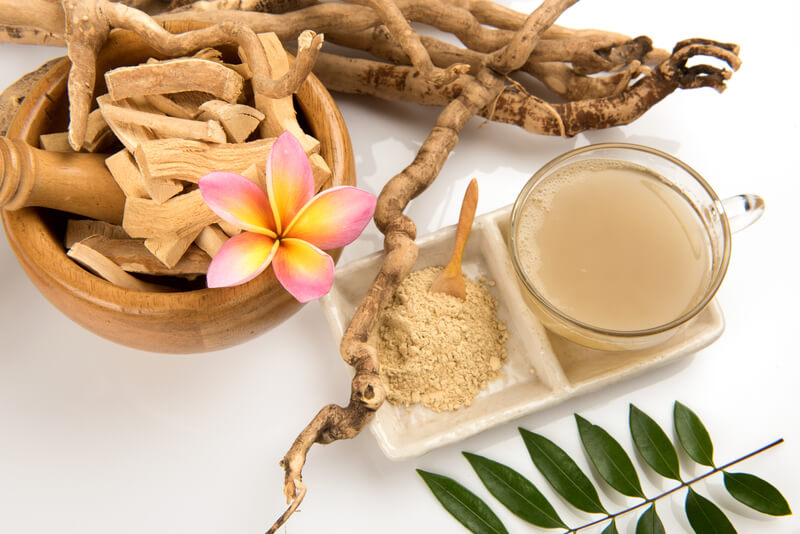
Why Does Tongkat Ali Taste So Bitter?
You may be familiar with the taste of Tongkat Ali, a traditional plant-based medicine that has been used for centuries in Southeast Asia. This fascinating remedy is known to have many health benefits, but why does Tongkat Ali taste so bitter? We'll explore the unique mix of ingredients that give Tongkat Ali its signature flavor and find out what makes it so special.
Before exploring further, please read the disclaimer located at the end of this webpage.
Key Takeaways
- The bitterness of Tongkat ali stems from compounds such as eurycolacnone, quassinoids, canthin-6-one alkaloids, and β-carboline alkaloids.
- There are several ways to mitigate the unpleasant bitterness of Tongkat ali, including combining it with other herbs, choosing Tongkat ali capsules, or mixing Tongkat ali with coffee, smoothies, or your breakfast.
Why Does Tongkat Ali Taste So Bitter?

As an ancient traditional remedy hailing from Southeast Asia, Tongkat Ali's roots carry a bitter taste that has become synonymous with its renowned qualities.
However, incorporating this herbal remedy into one's routine can pose a challenge due to the difficulty many individuals experience in tolerating its bitterness.
So, why does Tongkat Ali taste so bitter? Does it come from compounds of Tongkat Ali or from ingredients that manufacturers added to the supplement?
The answer is their bitterness come from various classes of bioactive compounds, including quassinoids, canthin-6-one alkaloids, β-carboline alkaloids, triterpene tirucallane type, squalene derivatives, biphenyl neolignan, eurycolactone, laurycolactone, eurycomalactone, and bioactive steroids [1].
Fortunately, advancements in technological techniques, particularly in the medical field, have yielded promising results.
Researchers and developers have successfully extracted and refined Tongkat Ali into various forms of products, such as herbal drinks or pills containing the potent herb.
Moreover, to mitigate its bitter taste, Tongkat Ali has been combined with other herbs or foods, resulting in more palatable options for consumption.
But what exactly causes Tongkat Ali to possess such bitterness? To answer this question, let us delve into the components of the Tongkat Ali root and their effects on the human body.
Also read: Is Tongkat Ali a Good Aromatase Inhibitor?
Compounds of Tongkat Ali That Contribute To Its Bitterness
Quassinoids
Quassinoids, a group of bitter compounds found in Tongkat Ali, are highly oxygenated and known for their diverse therapeutic properties.
These quassinoids are structurally complex and are bitter principles present in species of the Simaroubaceae family [2] [3].
Their bitter taste is acknowledged in the study titled "Effect of Tongkat Ali on stress hormones and psychological mood state in moderately stressed subjects" [1].
Quassinoids have been identified as some of the most bitter compounds in nature and serve as key components responsible for the bitter taste associated with Tongkat Ali [1].
Research has highlighted the potential therapeutic benefits of quassinoids, including their anti-inflammatory, antimalarial, anticancer, and aphrodisiac properties [1].
Additionally, studies have demonstrated their inhibitory and apoptotic activities on cancer cell lines, indicating their potential as therapeutic targets for conditions such as benign prostatic hyperplasia (BPH) [6].
It is evident that the bitter taste of quassinoids in Tongkat Ali is a result of their chemical composition and structural complexity, contributing to the overall profile of this botanical extract [1] [2] [3].
Alkaloids
Alkaloids are known to contribute to the efficacy and bitterness of Tongkat Ali. They exhibit Cytotoxic and Anti-Proliferative Effects, particularly notable in human lung cancer and human breast cancer cell lines [1].
According to the study [1], four canthin-6-one alkaloids displayed cytotoxic effects against various cell lines, including different types of human cancer cells and murine lymphocytic leukemia.
Moreover, the alkaloids from the root of Tongkat Ali show potential for preventing or treating inflammatory diseases. They also exert an Osteoporosis Preventive Effect, aiding in reducing bone loss and maintaining bone formation rates [1].
Ping-Chung Kuo and colleagues' research [7] concludes that these compounds were screened for in vitro cytotoxic and antimalarial activities.
Additionally, a study on the Bitter Taste Effects of Alkaloids in insects suggests that they generally avoid bitter-tasting substances as they associate them with harmful food [7].
Phytochemicals
Phytochemicals, including saponins, flavonoids, and tannins, constitute an integral part of Tongkat Ali's bitter flavor.
Saponins, for example, are complex glycosides known for their bitter, astringent taste, and their presence in Tongkat Ali contributes significantly to its distinctive bitterness.
Flavonoids, on the other hand, are a diverse group of plant chemicals with very important phytochemical or secondary metabolites recognized for their beneficial health effects, including antioxidant, anti-inflammatory, and anti-cancer properties [8].
While they don't necessarily taste bitter, certain flavonoids can impart a biting aftertaste.
Lastly, tannins, a type of polyphenol, are found in many plants and are renowned for their sharp, sometimes bitter flavor. Their presence in Tongkat Ali only adds to the herb's already potent bitterness.
Collectively, these phytochemicals add not only to the taste but also to the therapeutic potential of Tongkat Ali, making it a potent, albeit bitter, herbal remedy.
How to Decrease Taste Of Bitterness from Tongkat Ali?
Knowing "Why does Tongkat Ali taste so bitter?" is good for you when consuming them because the strong bitterness of Tongkat Ali can deter some people from experiencing its health benefits.
However, there are several ways to decrease this bitter taste, making the herb more enjoyable and easier to consume. Let's explore some of these methods to make Tongkat Ali a more palatable supplement in your daily routine.
Mixed With Other Ingredients
Mix it into protein shake along with yogurt, bananas, and other fruits, so it somewhat masks the bitter taste. It can also be mixed with coffee.
You could even opt for dietary supplements containing Tongkat Ali combined with other herbs like Fadogia Agrestis. This not only helps enhance the effectiveness of Tongkat Ali but also reduces the pure bitterness of Tongkat Ali.
However, self-combining Tongkat Ali with another type of food is not recommended. Be cautious and always consult a doctor before combining it with any other substances.
Additionally, there is another effective and convenient method to reduce the bitterness of Tongkat Ali: selecting an appropriate form of Tongkat Ali that has been processed by the manufacturer to minimize its bitterness.
You may also like: Will Tongkat Ali Fail A Drug Test? Benefits For Athletes
Choosing Other Forms Of Tongkat Ali Products
There are several forms of Tongkat Ali available that help reduce its natural bitterness.
The capsule form is widely preferred for its effectiveness, easy production, and global popularity. It offers an optimized dosage solution, convenience, and a longer shelf-life while still providing health benefits.
Capsules effectively mask the bitter taste and earthy flavor of Tongkat Ali, making them more appealing to those who find the natural taste unpleasant. This form is perfect for individuals seeking a convenient and manageable way to consume Tongkat Ali.
Alternatively, tablets can be chosen for those who prefer not to use capsules but still want to avoid the bitter taste. Tablets also offer the advantage of taste concealment, ensuring a more pleasant consumption experience.
For those looking for a unique option, Tongkat Ali Coffee is highly recommended. This form provides numerous advantages, including a synergistic effect and the added convenience of a beverage.
Not only does Tongkat Ali Coffee effectively diminish the inherent bitterness of Tongkat Ali, but it also makes it more palatable and enjoyable for users.
Conclusion
In conclusion, the distinctly bitter taste of Tongkat Ali is primarily due to the presence of quassinoids and alkaloids, bioactive compounds that contribute not only to the herb's taste but also its therapeutic benefits. Although the bitterness might be challenging for some to tolerate, understanding “Why does Tongkat Ali taste so bitter?” and its origin can help appreciate its significance. Ultimately, the bitter taste is a small compromise for the immense health benefits that Tongkat Ali has to offer.
References
- [1] Shaheed Ur Rehman, Kevin Kyungsik Choe, & Hye Hyun Yoo. (2016). Review on a Traditional Herbal Medicine, Eurycoma longifolia Jack (Tongkat Ali): Its Traditional Uses, Chemistry, Evidence-Based Pharmacology and Toxicology. Molecules, 21(3), 331–331. https://doi.org/10.3390/molecules21030331
- [2] González-Coloma, A., ReinaM., Díaz, C. E., & Fraga, B. M. (2010). Natural Product-Based Biopesticides for Insect Control. Elsevier EBooks, 237–268. https://doi.org/10.1016/b978-008045382-8.00074-5
- [3] Wright, C. (2009). Antiprotozoal natural products. Elsevier EBooks, 428–435. https://doi.org/10.1016/b978-0-7020-2933-2.00028-9
- [4] Hnin Ei Thu, Hussain, Z., Isa Naina Mohamed, & Ahmad Nazrun Shuid. (2018). Eurycoma longifolia, A Potential Phytomedicine for the Treatment of Cancer: Evidence of p53-mediated Apoptosis in Cancerous Cells. Current Drug Targets, 19(10), 1109–1126. https://doi.org/10.2174/1389450118666170718151913
- [5] Talbott, S., Talbott, J. A., George, A., & Pugh, M. (2013). Effect of Tongkat Ali on stress hormones and psychological mood state in moderately stressed subjects. Journal of the International Society of Sports Nutrition, 10(1). https://doi.org/10.1186/1550-2783-10-28
- [6] Mathias-Mathew Hipolith, Khor, B., Hirasawa, Y., Vikneswaran Murugaiyah, Chong Yew Lee, Morita, H., Wong, P.-F., & Chan, K. (2023). Quassinoids from Eurycoma longifolia Jack roots and their potential inhibitory activity against human benign prostatic hyperplasia cells (BPH-1) and testosterone-induced BPH rat model. Fitoterapia, 166, 105468–105468. https://doi.org/10.1016/j.fitote.2023.105468
- [7] Muñoz, I. J., Schilman, P. E., & Barrozo, R. B. (2020). Impact of alkaloids in food consumption, metabolism and survival in a blood-sucking insect. Scientific Reports, 10(1). https://doi.org/10.1038/s41598-020-65932-y
- [8] Abubakar, M. (2017). Chemical Composition of Eurycoma longifolia (Tongkat Ali) and the Quality Control of its Herbal Medicinal Products. Journal of Applied Sciences, 17(7), 324–338. https://scialert.net/fulltext/?doi=jas.2017.324.338
Author

Product Disclaimer
Including an ingredient or study does not evaluate, endorse, or recommend any Vinatura product or any third-party product. Some ingredients discussed may not be used in any Vinatura product.
The content of the articles has not been evaluated by the Food and Drug Administration (FDA) and is not intended to promote or endorse any specific product. Any products sold on this website are not intended to diagnose, treat, cure, or prevent any disease.
Opinions and Endorsements
Any claims, statements, or opinions expressed in the articles are those of the author(s) and do not necessarily reflect the views or opinions of the manufacturers of the dietary supplement products. The products sold on this website are separate from the content of the articles and are not directly endorsed or associated with the information presented here.
Liability Disclaimer
The author(s) of the articles, website, and manufacturers of the dietary supplement products do not assume any liability for any potential consequences arising from the use of the information provided in the articles. Ingredient effects, dosages, and safety vary by individual, formulation, and context; some ingredients interact with medications or may be unsuitable during pregnancy or lactation. It is recommended that individuals consult with a qualified healthcare professional before making any dietary or lifestyle changes, including the use of dietary supplements.
Product Usage
Please refer to the product labels and packaging for specific usage instructions and guidelines for the dietary supplement products sold on this website.
Customer Support
For any concerns or questions regarding the dietary supplement products, please contact our customer support team, who will be more than happy to assist you.







Leave a Comment
Be the first to comment.
What do you think?